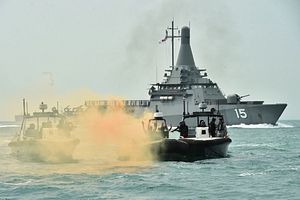On February 19, Singapore announced its budget allocations for 2018. Though the focus was predominantly on domestic items such as an impending tax hike and spending on transportation, the country’s allocation for defense also bears closer attention as it is rooted in several broader trends currently underway in the Southeast Asian state.
Singapore has consistently spent significant amounts on its defense, both because of the vulnerability it perceives as a small city-state as well as its economic success, which afford it the resources to do so. As a result, it already possesses one of the most capable and modern militaries in the region. It is therefore no surprise that the city-state has consistently ranked among the top in defense spending regionally but also globally depending on the metrics used, be it military expenditures or defense spending as a percentage of GDP or amount of arms imports.
For instance, in terms of defense spending as a percentage of GDP, while most regional states have struggled to get defense spending up to one or two percent, Singapore has consistently registered figures of three or four (sometimes even five) percent over the years. In terms of military expenditure, to take last year as an example, despite its small size, Singapore’s military expenditure was the seventh highest among all countries surveyed in Asia and Oceania by the Stockholm International Peace Research Institute (SIPRI) back in 2016, after China, India, Japan, South Korea, Australia, and Pakistan respectively (that put Singapore before other capable players in the region such as Taiwan, Indonesia, and Vietnam).
Yet though those figures are quite impressive, they also miss the fact that broader trends in the city-state, including growing political contestation and economic challenges, have led to increased domestic scrutiny over the amount of defense spending over the past few years. To take just one example, during the lead up to Singapore’s last election in 2015, members of the opposition challenged the country’s high defense spending as well as the acquisition of certain big-ticket items to an extent not seen in previous polls.
As a result, Singapore has had to factor these considerations into the way it allocates and messages its defense spending. In the 2017 budget, defense was cast as one of four ministries where the government’s two percent downward adjustment across all ministries would be phased in over several years. Defense Minister Ng Eng Hen had also signaled that despite budgetary pressures and cost-cutting initiatives, Singapore’s objective would still be to maintain a defense budget increase of around 3 to 4 percent per year to keep pace with inflation and to respond to a range of security challenges.
As a result, 2017 witnessed a rather small defense budget increase, relatively speaking, from the revised figure of around 13.84 billion Singapore dollars (SGD) to 14.21 billion SGD, or about 2.6 percent (the change is 1.6 percent if one takes the initial figure of 13.97 billion SGD). That was a reduction compared to previous years, with the last two years bringing increases of 5.2 percent and 6.3 percent respectively.
The defense budget amount announced this week of 14.76 billion SGD constitutes a 3.7 percent increase over last year’s 14.21 billion. This year’s rise is higher than the budget increase in 2017, but also still keeps within the 3 to 4 percent range that Ng had indicated that Singapore would seek to maintain. Defense was the top line item in the budget at over 18 percent of it, followed by transportation at over 17 percent.
Ahead of the issuing of the budget, Singapore officials had indicated that they would expect to see spending on security more generally to increase this year. Finance Minister Heng Swee Keat, who delivered the 2018 budget this week, had said in early February that the rise of threats, including terrorism, meant investing in security was important for the city-state, and that he expected the trend of increases in security spending to continue for the next decade. That was yet another confirmation that despite the challenges Singapore faces, the government remains keen on ensuring that it continues to invest what it needs for its defense.

































